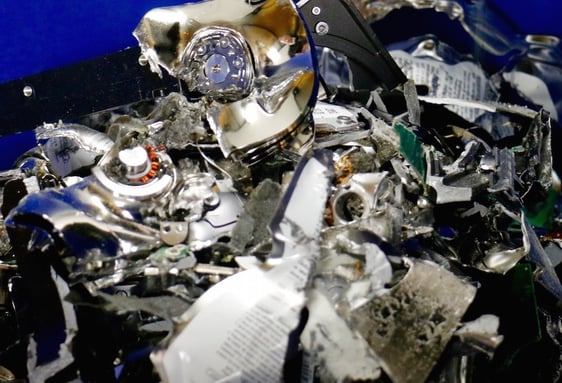Hard Drive Destruction: What Not to Do
Wed, Jan 25, 2017
By: Jacob Gilmore

Protecting your business’s data is critical to the continued health of your company. Financial and employee records, and other proprietary data stored on hard drives needs to be protected whether that data has reached the end of its lifecycle or not.
Professional and secure hard drive destruction remains one of the only ways to absolutely ensure compliance and the safe removal of sensitive data. Despite the cost-effective nature of certified data destruction, many businesses continue to make critical mistakes during the disposal process, potentially exposing their company’s valuable data.
If you want to avoid making similar mistakes, here are four things to avoid during the hard drive destruction process.
1. Trying the DIY Approach
Many businesses, both large and small, stick with the Do-It-Yourself (DIY) approach for many business processes. While this method can save time and money in many areas, hard drive destruction isn’t one of them.
Assigning an untrained employee to take a hammer to hard drives in an attempt to “destroy” them is one popular method. Unfortunately, even data on partially damaged hard drives can be retrieved, so, if your staff member leaves the job unfinished, your business’s data could be exposed.
Simply dropping the hard drive in the trash after erasing it is another popular approach. “Who could possibly want or be able to access the data on a wiped hard drive?” you might ask. However, data thieves can easily access data on abandoned hard drives, even those you may have erased files from.
Learn how to properly destroy hard drives and other products for your business.
2. Destroying hard drives before information has reached the end of it's lifecycle
As a business owner, you need to ensure federal and state compliance in many areas of your business, including HIPAA for healthcare information and Sarbanes Oxley for financial data.
In order to maintain compliance, you must retain certain files for a specified period of time. Destroying hard drives too soon could put your business at risk of fines.
Working with a professional data destruction company can ensure proper compliance and destruction scheduling. Make sure any potential partner is certified through the National Association of Information Destruction (NAID).
3. Storing old hard drives on-site
Storing hard drives on-site is another mistake some businesses make when abandoning old or disused technology, but this strategy risks exposing sensitive information to opportunistic theft or violating compliance standards.
Additionally, it’s tremendously inefficient. Computers stored on-site take up space that could otherwise be used for additional workspace and revenue-generating activities.
4. Working with an inexperienced data destruction company
Even companies that choose to work with a professional data destruction company aren’t immune to mistakes. In fact, choosing to work with an inexperienced or unreputable partner can prove just as damaging as taking the DIY approach or storing files on-site.
Any data destruction company you choose to work with should offer trained staff members, thorough documentation and tracking, and an official NAID Certificate of Destruction.
At Gilmore Services, our team understands the importance of complete, secure data destruction. Our hard drive shredding services are AAA certified by the National Association for Information Destruction (NAID), which keeps us compliant with data protection laws such as FACTA, HIPAA, and Sarbanes Oxley. And, our equipment meets all regulatory standards for Department of Defense. Each of these certifications and our ongoing experience is in place to help businesses like yours remain compliant and efficient.
Learn more about which data destruction services are right for your business.